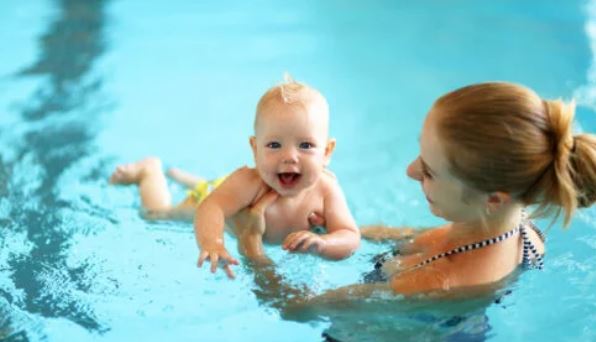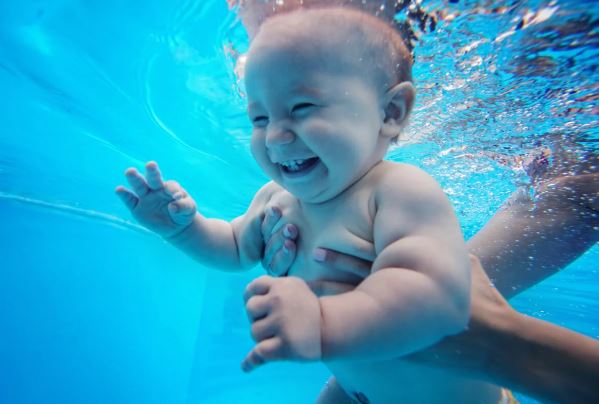If you are wondering at what age you can take your baby to the pool, this article interests you. According to some specialists, from the first months you can do it by following some guidelines and recommendations.

The recommended age to allow the baby to enter a pool goes hand in hand with the vaccination cycle. You can take it once immunized, which is equal to four months, depending on the calendar that governs your country. At this age they already have protection and motor development will be enhanced in the water, since the swimming reflections have not yet disappeared.
The baby moves better in an aquatic environment than in a terrestrial one and the reasons are in the reflexes that she possesses. He was in the amniotic fluid for nine months and actually comes prepared to swim. This has been discovered and developed by midwifery as a comprehensive stimulus plan for babies and parents.
Despite these studies, there are those who prefer to maintain a more conservative position and wait until the baby has reached the first semester of life and thus avoid exposing it at such an early age to chlorine, the sun and temperatures that may lead to its first colds
What risks can swimming pools have for babies?

The benefits of midwifery outweigh the risks.
The main risk is also the easiest for parents to avoid. It presents itself as an accident and is more frequent than we think. It is about drowning by immersion; therefore, when you have a baby in the pool, you must redouble your vigilance. Be alert and remember that the baby should always be at your fingertips.
In addition, you should have the towel, toys or any other implement that you consider necessary nearby. It does not hurt to go to the pool accompanied by someone who can assist or relieve you if there is an event that warrants being alone.
Low temperatures
Temperature is an element that you must attend to when taking the baby to the pool, since it has very sensitive skin and either extreme would be inconvenient. In the case of premature babies, some still find it difficult to regulate it.
Considering the young age at which the baby can enter the pool, the temperature should not be lower than 30 ° C, there are even heated pools that are around 32 ° C. Although the regulations that regulate the hygienic-sanitary conditions of swimming pools for collective use in Madrid, to cite an example, generally consider that the temperature should be between 24 and 28 ° C.
Chemicals
All pools require strict maintenance to meet the sanitary standards that make them optimal. This involves using chemicals such as chlorine or other specialized agents that will prevent the proliferation of bacteria.
When it comes to swimming pools for babies, they tend to use a natural chlorination other than synthetic chlorine to take care of the health of the little ones. The exposure of infants to these products is under discussion and respiratory conditions such as asthma are not ruled out. It will still be important that you prevent the baby from swallowing water or, if you do, that it is as little as possible.
Possibility of infection
Complying with all cleaning protocols to maintain proper hygiene in the pool does not exempt it from risks. No matter how clean it may be, being a place of community gathering, it is exposed to contaminants that are imperceptible to the naked eye.
Among them the excrement particles that users can release, being more common in the case of babies or young children. Although there are special swimsuits to contain stool, they are not 100% waterproof, and the tiny particles can give rise to diseases. Among the most common are the following:
Diarrhea or other gastrointestinal disorders.
Ear infections that in the most serious cases can lead to complications such as a perforated eardrum or hearing problems.
Respiratory conditions.
Eye infections
Dermatological diseases
However, studies show that there is no significant relationship between these infections and that the child has started aquatic activity before one year.
Solar exposition
It is appropriate that the baby is not directly exposed to the sun’s rays. You should, then, cover the area in which she is with a parasol and dress her in a shirt and hat. In any case, the bath cannot go beyond 10 minutes so that she does not get tired and take care of her skin.
At what age are swimming lessons recommended?
Swimming lessons are recommended from the age of four. However, in the case of babies, water activities are suggested between four and six months of age or, as has been said, when they have completed the first cycle of immunization.
This is done in this way to take advantage of and stimulate the development of your motor skills and innate reflexes, such as the one that allows you to close the glottis and submerge for short periods in the water.
How to prepare babies for the pool?

Make sure your child has their needs met before entering the pool.
For the baby to enjoy it to the maximum, it is necessary that he is not hungry, enter the pool early, before eating or in the afternoon after a nap. On the other hand, although the recommended age to let the baby into a pool is from four months, only if she is older than six can you apply a sunscreen suitable for her skin.
The ideal is to choose a good moment; the pool is quiet and there are no children running around and splashing water. After going out, and after the shower that removes the remains of the chlorinated water, apply a moisturizer to the baby.
Swimming equipment for baby
The most ideal when taking the baby to the pool is the cork board with a wide base and a hole that fits into it. She allows you to maintain a horizontal position and can move and move with more and more confidence.
Another equipment is the churro, with which she acquires balance and flotation, but does not offer the advantages in safety and handling of the board. Finally, a small inflatable pool makes it in contact with the water and guarantees much higher levels of care.
Benefits of swimming for the baby
Swimming stimulates the baby’s entire locomotor system. Studies reveal that the earlier they start swimming, the faster they crawl, move and interact with other children.
The respiratory system and the heart also benefit. And, perhaps the essential thing is that the affective bond grows with the parents who hold it, sing it and protect it. Thus, the relationship that is just beginning is strengthened and the time of care is filled with fullness.
Tips and Recommendations
Saltwater pools are an option for babies because the chemical concentration is lower. But they are not exempt from products that can cause allergies or respiratory irritations.
It would not hurt to consult the baby’s pediatrician about your intentions to take him swimming, so he will provide his criteria on the recommended age to let the baby into a pool and will give you some suggestions to make it a safe and rewarding experience for everyone.
The baby in the pool, final advice
If possible, choose pools that are not very crowded and specially acclimatized for babies and children. Thus, the possibility of fluids such as sweat or urine that in contact with chlorine can generate unnecessary complications is minimized.
However, to be safer, take the baby to the pool only after completing the vaccination cycle. And from the first moment, whenever it is in contact with water, do not neglect it for a minute. The risk of immersion is very high, so wisdom indicates that you should disconnect from the world to give it a full and unique interaction.





